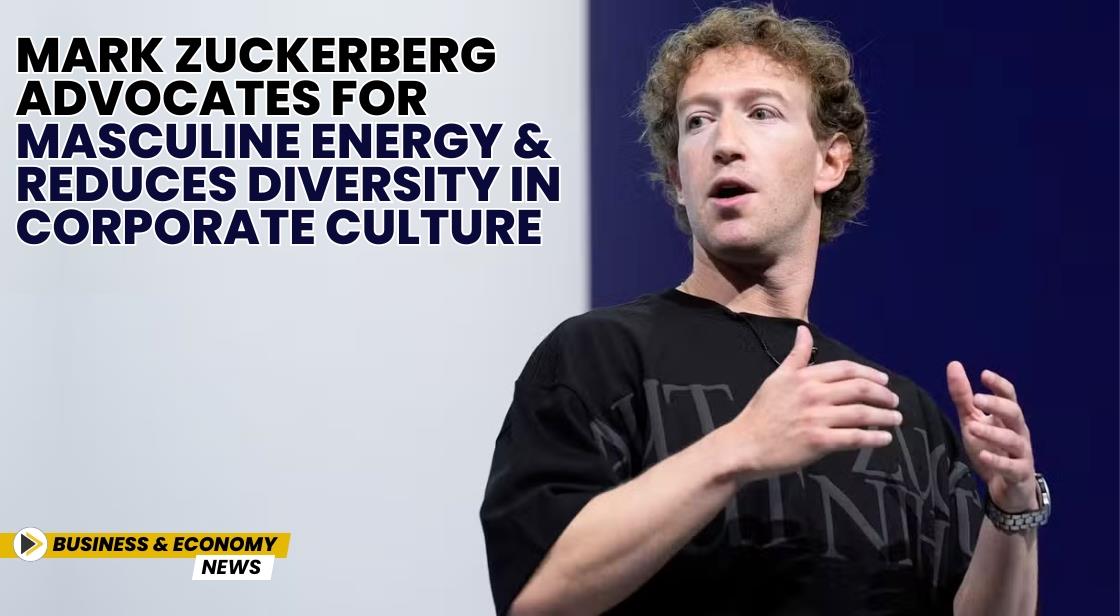Mark Zuckerberg Advocates for Masculine Energy and Reduces Diversity in Corporate Culture

News Synopsis
Meta CEO Mark Zuckerberg, often seen as a reserved figure in tech, has unveiled a new persona in a candid interview with podcaster Joe Rogan. Sporting a casual black T-shirt, gold chain, and a fresh blonde hairstyle, the world is dubbing this version of him "Zuck 3.0."
This new phase comes with bold ideas about corporate culture, centering on what he describes as "masculine energy" and reducing diversity initiatives at Meta.
Mark Zuckerberg’s Bold Vision for Corporate Culture
In his conversation with Joe Rogan, Zuckerberg reflected on what he views as the shift in workplace dynamics. "Masculine energy, I think, is good," he stated, suggesting that many modern corporate environments have moved away from traits traditionally associated with masculinity, such as assertiveness and aggression.
He advocates for workplaces that strike a balance between masculine and feminine energies, though he believes the current trend leans too much toward neutrality.
Meta CEO Mark Zuckerberg credited his personal interest in mixed martial arts (MMA) for influencing this philosophy. Describing MMA as a “much more masculine culture,” he emphasized its role in shaping his leadership style.
Meta’s Shift Away from Diversity, Equity, and Inclusion (DEI)
Coinciding with Zuckerberg’s remarks, Meta announced a significant rollback of its diversity, equity, and inclusion policies. An internal memo labeled “DEI” as a controversial term, with some employees perceiving it as favoring specific groups over others.
This decision includes the elimination of diversity training programs and a reduction in targeted hiring initiatives aimed at fostering inclusivity. Critics argue this shift could exacerbate existing disparities within the workplace and hinder Meta’s commitment to representation.
Relaxed Content Moderation and Fact-Checking Policies
Meta also revealed changes in its content moderation and fact-checking policies. The company will now allow more leniency for posts that criticize immigrants, transgender individuals, and non-binary communities.
Additionally, Meta has discontinued fact-checking measures in the United States, sparking concerns about the spread of misinformation.
Speculation About Meta’s Political Leanings
Zuckerberg’s recent comments and Meta’s policy changes have reignited debates about the company’s political affiliations. During the interview, Zuckerberg criticized the Biden administration for allegedly pressuring Meta to censor content during the pandemic. Simultaneously, he praised President-elect Donald Trump for his emphasis on “making America win.”
Observers suggest these moves align with conservative values, fueling speculation about a possible tilt toward right-wing ideologies.
Zuckerberg on Balancing Masculinity and Diversity
Despite advocating for masculine traits in the workplace, Zuckerberg emphasized that his vision does not aim to exclude women or diverse groups. “You want women to succeed and companies to unlock the value of great people no matter their background,” he said.
However, critics argue that Meta’s recent decisions appear to undermine this commitment, signaling a potential disconnect between rhetoric and action.
Implications of Meta’s New Direction
Meta’s shift in priorities raises questions about the future of inclusivity in the corporate world. By scaling back DEI initiatives, loosening content moderation, and discontinuing fact-checking, the company risks creating an environment that may foster exclusion and misinformation.
Conclusion
Mark Zuckerberg’s recent comments on corporate culture and Meta’s policy shifts signal a significant transformation in the tech giant’s approach to inclusivity and governance.
His call for embracing "masculine energy" in workplaces, coupled with Meta’s rollback of diversity, equity, and inclusion initiatives, reflects a controversial pivot that has sparked debates on representation and workplace dynamics.
While Zuckerberg advocates for balance and inclusivity, the scaling back of DEI programs and relaxed content moderation raise concerns about Meta’s commitment to diversity and factual integrity. These changes, along with Zuckerberg’s apparent alignment with conservative values, have drawn attention to Meta’s potential ideological leanings.
As the company navigates these cultural and political waters, the implications for workplace culture, user safety, and public trust remain uncertain. Meta’s new direction may redefine its corporate identity, but its long-term impact on inclusivity and innovation will be closely scrutinized by critics and supporters alike.
You May Like









